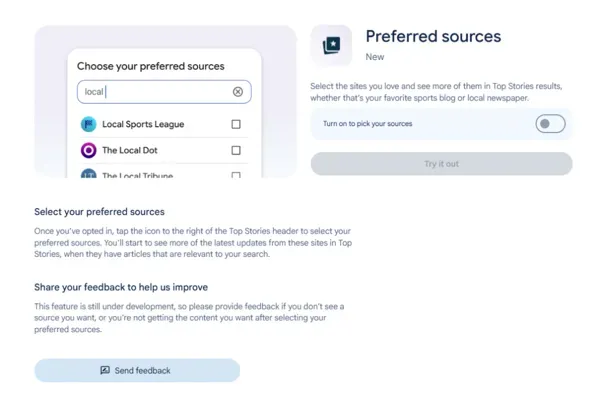Google Preferred Sources is a powerful tool designed to enhance your experience when sifting through Google search results. As the landscape of digital content evolves through Google algorithm updates, users often find it challenging to locate the most relevant or trustworthy sources amid a sea of AI-generated summaries. This innovative feature allows individuals to prioritize content from specific publishers, ensuring that they receive updates that align with their interests. By utilizing the Preferred Sources tool, you can significantly increase search visibility for your favorite outlets, enabling a more tailored and satisfying browsing experience. In an age where information overload is prevalent, Google Preferred Sources offers a beacon of clarity, allowing users to take control of their digital consumption.
In today’s dynamic online environment, having control over your information sources is more critical than ever, especially with the impact of algorithm changes on search outcomes. The Preferred Sources option functions similarly to a personalized content filter, enabling users to highlight specific publishers they trust and wish to see more frequently in their search inquiries. By prioritizing these sources, web surfers can navigate through the noise created by AI content summaries and ensure they access quality reporting directly linked to their interests. This adaptive feature is part of a broader effort to streamline the information retrieval process, as Google aims to modify how users interact with search results. Ultimately, understanding and utilizing alternative tools can empower individuals to stay informed without the overwhelm of unreliable data.
Navigating Google’s Algorithm Changes
In recent years, Google has undergone significant transformations in its search algorithms, impacting how results are displayed and which sources are prioritized. With hundreds of updates every year, including two to four major core updates, understanding these changes becomes essential for both users and publishers. These updates can radically affect website traffic and visibility in search results, even for content that was previously favored. As a user, you may have noticed a decline in relevance and an increase in AI-generated content that takes focus away from trusted sources.
The impact of these algorithm changes on search visibility cannot be understated. Articles and websites that previously ranked well can suddenly plummet in search results due to these continuous modifications. Therefore, keeping abreast of Google’s algorithm updates is crucial for those looking to optimize their content effectively. By understanding how Google prioritizes certain information, both users and content creators can better navigate the complexities of the search landscape while ensuring their interests are represented.
Frequently Asked Questions
What are Google Preferred Sources and how do they affect search results?
Google Preferred Sources are a part of a feature that allows users to prioritize specific publishers in their search results. When set, these sources are included in the ‘Top Stories’ module, ensuring that their content appears more frequently in your Google search results, especially during significant updates in Google’s algorithm.
How can I increase search visibility with Google Preferred Sources?
To increase search visibility using Google Preferred Sources, you can set your preferred publishers as sources in your settings. This will elevate their content within Google search results, enhancing your access to trusted and familiar information, amidst fluctuations caused by algorithm updates.
What impact do Google algorithm updates have on Preferred Sources?
Google algorithm updates can affect the visibility of Preferred Sources. Although these updates often change what content is ranked, setting your Preferred Sources helps maintain access to favored content that aligns with your interests, even when broader search results fluctuate.
Can AI content summaries undermine the value of Google Preferred Sources?
AI content summaries can sometimes overshadow Preferred Sources by summarizing information from various reports, potentially leading users away from the original publishers. However, by utilizing the Preferred Sources tool, you can ensure that the trusted information from your favorite sources appears more prominently in your Google search results.
How does the Preferred Sources tool work in Google search results?
The Preferred Sources tool works by allowing users to select preferred publishers, which will then be prioritized in Google’s search results, especially in the ‘From Your Sources’ section. This helps tailor search results to reflect the content from sources you trust.
What is meant by ‘Google Zero’ in the context of search results?
‘Google Zero’ refers to the phenomenon where users receive AI-generated summaries instead of visiting original articles. This can affect traffic to publishers and content creators, highlighting the importance of utilizing Google Preferred Sources to ensure reliable content from trusted sources is highlighted in your results.
How do I set my Preferred Sources in Google search?
To set your Preferred Sources, you can visit the Preferred Sources tool and select your favorite publishers. Alternatively, from any search results page, you can click the icon next to the Top Stories module to add sources directly, thereby optimizing Google search to your preferences.
| Key Points |
|---|
| Google’s Search Results Are Changing |
| Frequent Algorithm Updates |
| Impact of AI Summaries on Traffic |
| Google Preferred Sources Feature |
| Guidance on Setting Preferred Sources |
Summary
Google Preferred Sources are essential for enhancing your search experience in the evolving digital landscape. With recent algorithm changes and the introduction of AI summaries, searching for trusted information has grown increasingly complex. By utilizing Google Preferred Sources, users can prioritize content from their reliable sources, ensuring that they see more relevant and accurate results in their searches. This tool not only helps in reducing the noise caused by algorithmic changes but also enhances user control over what information they prefer to access. Users can easily set their preferred sources, helping to create a more tailored and satisfactory search experience.



























